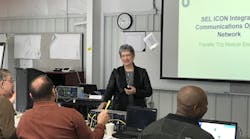Miriam Sanders’ philosophy is to never stop learning. She continues to learn by developing and teaching new courses at SEL University. As senior instructor, she tells students to be open to learning from anyone. “Even if you don't particularly like the person or the person's beliefs, you can always learn from them,” Sanders said.
Sanders' courses at SEL University survey the fundamentals of both relaying and communications, as well as application courses that cover specific SEL products. She is a senior member of the IEEE and serves as the chair of that organization’s Power and Energy Society (PES) Technical Council. She previously served as Vice Chair/Secretary of the PES Technical Council and is Past Chair of the PES Power System Relaying Committee.
Sanders' commitment to advancing knowledge within the power industry is further evidenced by her participation in the University of Wisconsin’s Communications for Power System Protection, Automation, and Smart Grid Technology courses. She also has played key roles in planning the Georgia Tech Protective Relaying Conference and Texas A&M University’s Conference for Protective Relay Engineers. Miriam, a registered Professional Engineer in North Carolina and Florida, joined SEL University in 2013. She previously worked with Quanta Technology, Pulsar Technologies, ABB Power T&D, Booth & Associates, and Westinghouse Electric.
Sanders shared her experience and excitement for her field with T&D World:
Q: How does your past experience help you in teaching SEL courses?
With my history in sales and marketing, I was always teaching customers about the technology and application of the products, so moving into a full-time instructor position allows me to further develop my teaching skills. One of the reasons that I went into engineering is that I loved math. My very first posiiton as a systems engineer out of college had me teaching customers on our products, so I have done it ever since.
Q: Why did you decide to go into your power systems engineering?
Since I loved it in school, a math degree was one option I was considering as I graduated from high school. I was also heavily involved in orchestra and was considering majoring in music. That is not as opposite as you would initially think because music is made up of math with its fractional notes (whole, half, quarter etc.), time signatures and harmonics. So it was a tough decision. My brother also encouraged me to pursue engineering. In my first semester of college, I sat beside an engineering major in chemistry class. He showed me the problems he worked on. Having always enjoyed puzzles, I was hooked. He introduced me to the engineering department head and I switched majors.
Q: Best thing about your job right now?
With teaching you really have to go back to the basics to ensure you can address most questions that come up in class. You really don’t know how much you don’t know until you try to teach it. So it’s really digging deep sometimes. And then there is the revelation of something you missed in college where you go “Wow, now it all comes together!”
Q: What courses/sessions do you teach?
I cover both communications and protection topics. However, I stick more with the fundamental courses (e.g., COM 401: Data Communications and PROT 401: Protecting Power Systems for Engineers) so that the Field Application Engineers and such can cover the equipment based courses as they have practical experience with the products. The one exception is the APP ICON: SEL ICON Integrated Communications Optical Network course. I like working with that product because it expands on my past communications experience.
Q: Why is communications and protection important?
Communications is ubiquitous today. And now more than ever in the power utility industry, intelligent devices are able to exchange data for protection, control and automation. Students who major in power probably never considered communications, so it can be a totally foreign subject to them. With my background in communications and protection, I can help them bridge that gap.
Q: What do you like to do in your spare time?
My spare time is spent with different crafts such as jewelry making, crocheting and knitting (which is really about math). I also enjoy watching baseball, which is also about math with the statistics. Plus, puzzles and games relative to math, like Sudoku or Rummikub. (I am horrible at Scrabble and crossword puzzles.)
Q: Anything else you would like to add about your teaching philosophy?
I believe you should learn at least one new thing every day. Look for those opportunities to enrich your knowledge or to enrich someone else’s.


